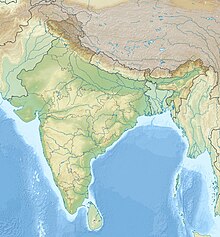
Back كهوف كارلا ARZ Coves de Karla Catalan Karla Caves German Cuevas de Karla Spanish Grottes de Karli French מערות קרלה HE कार्ले की गुफाएँ Hindi ಕಾರ್ಲ ಗುಹಾಲಯ Kannada കാർലാ ഗുഹകൾ Malayalam कार्ले लेणी Marathi
| Karla Cave | |
|---|---|
 The Great Chaitya in the Karla Caves, Maharashtra, built in 50-70 CE | |
| Location | Karli, India |
| Geology | Basalt |
The Karla Caves, Karli Caves, Karle Caves or Karla Cells, are a complex of ancient Buddhist Indian rock-cut caves at Karli near Lonavala, Maharashtra. It is just 10.9 Kilometers away from Lonavala. Other caves in the area are Bhaja Caves, Patan Buddhist Cave, Bedse Caves and Nasik Caves. The shrines were developed over the period – from the 2nd century BCE to the 5th century CE. The oldest of the cave shrines is believed to date back to 160 BCE, having arisen near a major ancient trade route, running eastward from the Arabian Sea into the Deccan.
The group at Karla is one of the older and smaller of the many rock-cut Buddhist sites in Maharashtra, but is one of the best-known because of the famous "Grand Chaitya" (Cave 8), which is the largest and most completely preserved" chaitya hall of the period, as well as containing unusual quantities of fine sculpture, much of it on a large scale.[1]
Many traders, Western Satraps of Saka origin and Satavahana rulers made grants for construction and support of these caves. Karli's location in Maharashtra places it in a region that marks the division between North India and South India.[2] Buddhists, having become identified with commerce and manufacturing through their early association with traders, tended to locate their monastic establishments in natural geographic formations close to major trade routes so as to provide lodging houses for travelling traders.[3] Today, the cave complex is a protected monument under the Archaeological Survey of India.[4]
- ^ Michell, 374
- ^ "Later Andhra Period India". Retrieved 24 January 2007.
- ^ Keay, John (2000). India: A History. New York, USA: Grove Press. pp. 123–127. ISBN 0-8021-3797-0.
- ^ "Karla Caves". NIC. Retrieved 19 May 2012.
